AI Tools for Compost Nutrient Analysis
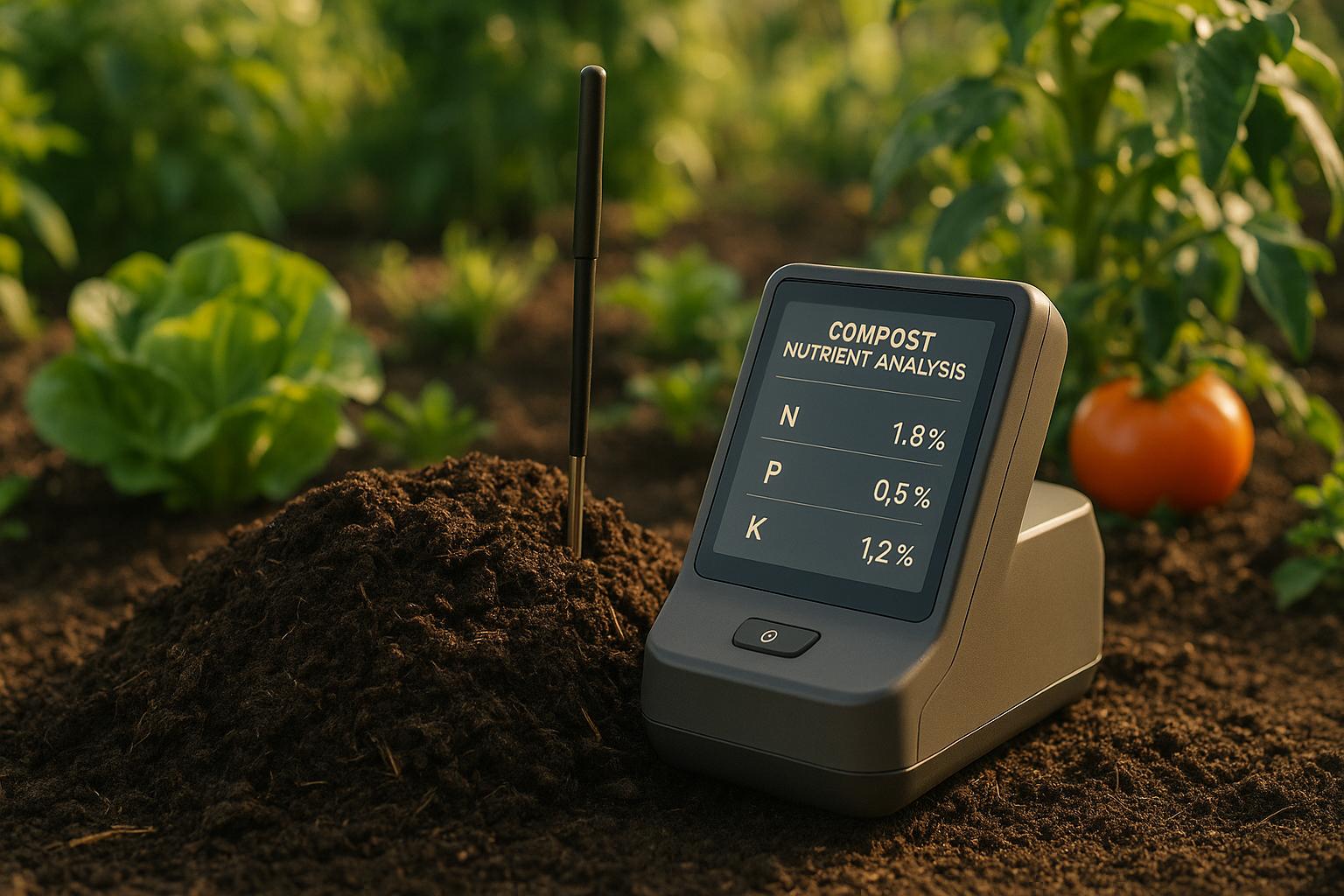
AI tools are transforming compost nutrient analysis, making it faster, more accurate, and accessible for gardeners and farmers. Here's how three leading tools compare:
- AIGardenPlanner: Best for beginners and home gardeners. It combines garden design with basic nutrient analysis. Plans start at $15 for one-time use.
- AI-Enhanced Soil Testing Tools: Ideal for precision agriculture, offering real-time, detailed nutrient insights in minutes. Costs vary based on usage, but savings in fertilizer and increased yields often offset the investment.
- BeCrop by Biome Makers: Focuses on microbial activity in soil, helping commercial farmers optimize nutrient cycling. Suited for advanced users; pricing is tailored for large-scale operations.
Quick Comparison
| Tool | Best For | Key Features | Main Limitation | Pricing |
|---|---|---|---|---|
| AIGardenPlanner | Home gardeners, beginners | Easy-to-use, garden design + analysis | Limited detailed insights | Starts at $15 (one-time use) |
| AI Soil Testing | Precision agriculture | Real-time, detailed insights | Requires technical expertise | Varies, ROI in 1-2 seasons |
| BeCrop | Commercial farming | Microbial process focus | Not beginner-friendly | Custom pricing |
AI-powered tools are reshaping agriculture by improving soil health, reducing fertilizer waste, and boosting crop yields. Whether you're a hobbyist or a professional, there's an AI tool to meet your compost analysis needs.
Soil Quality Analysis Made Simple: AI-Powered App Demo for Smarter Farming!

1. AIGardenPlanner
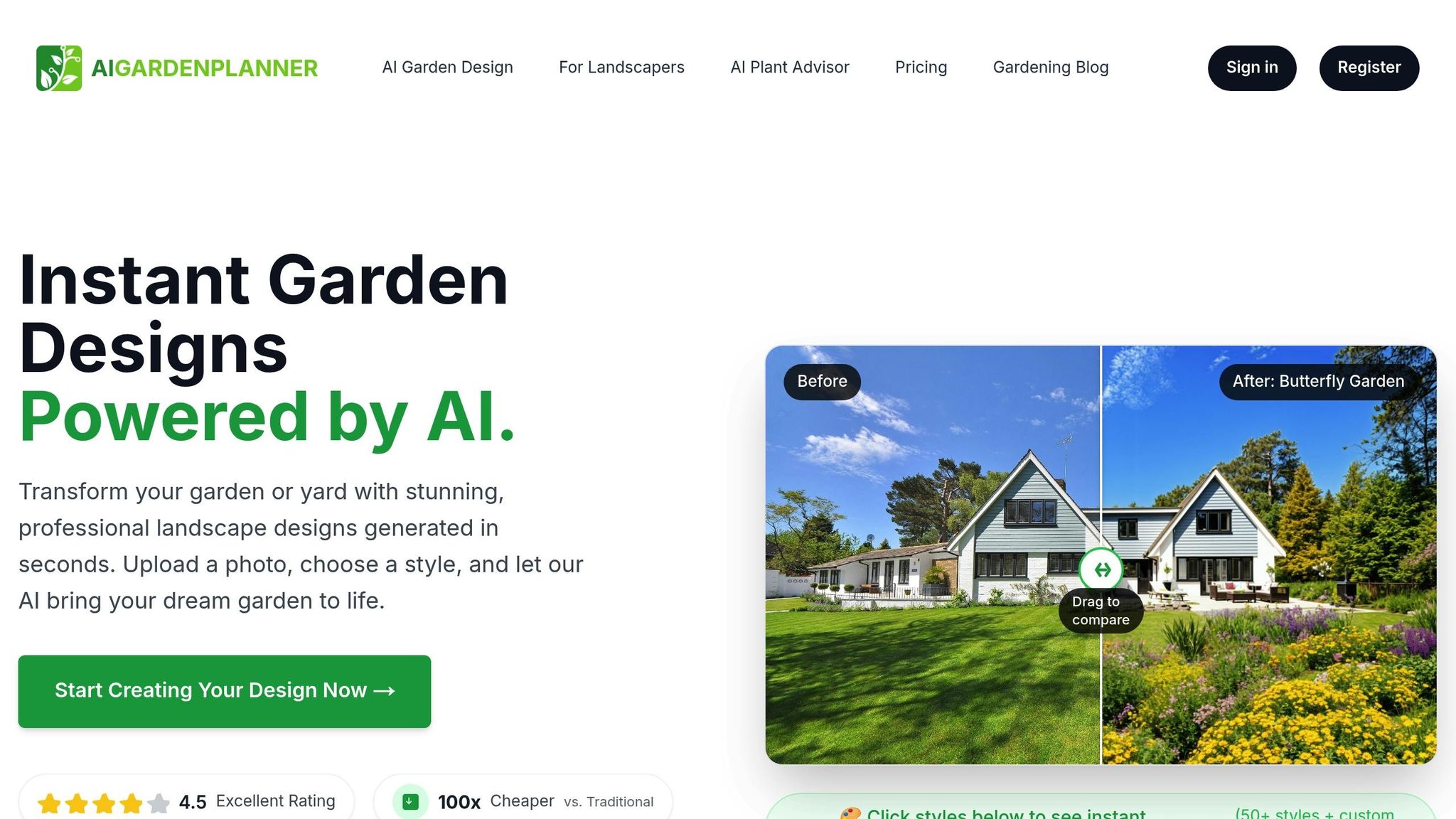
AIGardenPlanner combines advanced AI tools for garden design with detailed nutrient analysis, making it a go-to platform for anyone looking to optimize their gardening efforts. Its standout feature, the AI Plant Advisor, transforms ordinary garden photos into professional-grade landscape designs. But it doesn't stop there - its AI-driven algorithms also dive deep into soil composition to provide tailored recommendations for compost application.
Nutrient Profiling
The platform’s AI algorithms take nutrient analysis to the next level. They identify key nutrients like nitrogen, phosphorus, and potassium, as well as trace elements like calcium, magnesium, and sulfur. Beyond just identifying these components, the system evaluates both biological and chemical properties to spot deficiencies and track soil quality over time. Plus, it uses a combination of historical data, local environmental conditions, and plant growth stages to predict future nutrient needs. This ensures your plants get the right nutrients at the right time [2].
Data Sources
To deliver accurate recommendations, AIGardenPlanner pulls data from various sources, including soil composition, local weather patterns, plant genetics, and historical crop yields. It also incorporates real-time environmental monitoring, analyzing factors like soil moisture, temperature, and seasonal shifts. This helps determine the perfect timing for compost application, maximizing its effectiveness [2].
Target Audience
This feature is designed for a wide range of users, from home gardeners in the U.S. to professional landscapers and small-scale farmers. Its easy-to-use interface makes it accessible even to those unfamiliar with soil science, while its in-depth insights cater to professionals managing multiple properties. The system not only supports healthier plants but also minimizes the need for synthetic fertilizers, making it an eco-friendly choice [1].
Pricing Model
AIGardenPlanner offers flexible plans to suit different needs:
- Pay As You Go: $15 for one-time use.
- Starter Plan: $19/month or $9/month if billed annually, allowing up to 4 projects without watermarks.
- Pro Plan: $49/month or $21/month annually, including a commercial license for up to 50 projects.
- Premium Plan: $99/month or $42/month annually, offering 500 AI-generated photos per month for up to 1,000 projects.
These pricing options make it easy for users of all scales to integrate precise compost nutrient analysis into their garden management strategies. Whether you're a hobbyist or a professional, there’s a plan that fits your needs.
2. AI-Enhanced Soil Testing Tools
AI-powered soil testing tools are transforming how we analyze compost nutrients by blending traditional soil science with cutting-edge artificial intelligence. Using advanced sensors, spectroscopy, and machine learning, these tools provide accurate nutrient readings in mere minutes - far faster than the days or weeks required by traditional lab testing. This approach delivers real-time insights, helping farmers and gardeners make smarter, more cost-effective decisions.
Nutrient Profiling
These modern tools can detect all the essential nutrients plants need to thrive. They measure primary macronutrients like nitrogen (N), phosphorus (P), and potassium (K), as well as vital micronutrients such as calcium, magnesium, sulfur, iron, and zinc. AI algorithms also evaluate factors like soil pH, electrical conductivity, and organic matter content, creating a detailed nutrient profile.
For instance, ChrysaLabs has developed a device that uses AI and spectroscopy to scan a soil sample's chemical composition in under 30 seconds [3]. Similarly, Farmspace offers a tool that not only measures N, P, K, and micronutrients but also assesses pH levels, conductivity, and infiltration rates [4].
Data Sources
AI-enhanced soil testing tools pull data from a variety of sources to provide actionable insights. The primary data comes from real-time soil sample analysis, but these tools also incorporate information like weather trends, historical crop performance, and local environmental conditions. Some even use remote sensing and image recognition to monitor soil moisture and type [5][6].
Field tests have shown that these tools can help landowners cut fertilizer expenses and boost farming efficiency [4].
Target Audience
These tools cater to a wide range of users, from home gardeners to commercial farmers. Reports suggest users have seen up to a 25% increase in crop yields and a 30% reduction in fertilizer costs - all while achieving their desired outcomes [5][8].
"After implementing precision soil management, we cut our fertilizer waste by 30% while increasing our yields by 25%. The initial investment paid for itself within two growing seasons." – Dave Thompson, Local Farmer from Lacombe County [8]
This combination of practicality and affordability makes AI-powered soil testing tools an appealing choice for many.
Pricing Model
The pricing for these tools is competitive and designed to deliver value. For example, Ballance Agri-Nutrients' SpreadWise tool costs $6 per hectare annually (around $2.43 per acre) or $3 per hectare (around $1.21 per acre) for shareholders [9]. These investments often pay off quickly. Prairie Organic Farm in Red Deer, Alberta, recouped their $75,000 investment in soil sensors and machine learning technology within 18 months, thanks to reduced fertilizer waste and higher crop value [8].
sbb-itb-4d6a8dd
🚀 Ready to Reinvent Your Garden?
Join thousands of homeowners who have transformed their gardens using our AI design tool. Upload one photo to explore endless possibilities.
Get your AI garden designs →3. BeCrop by Biome Makers
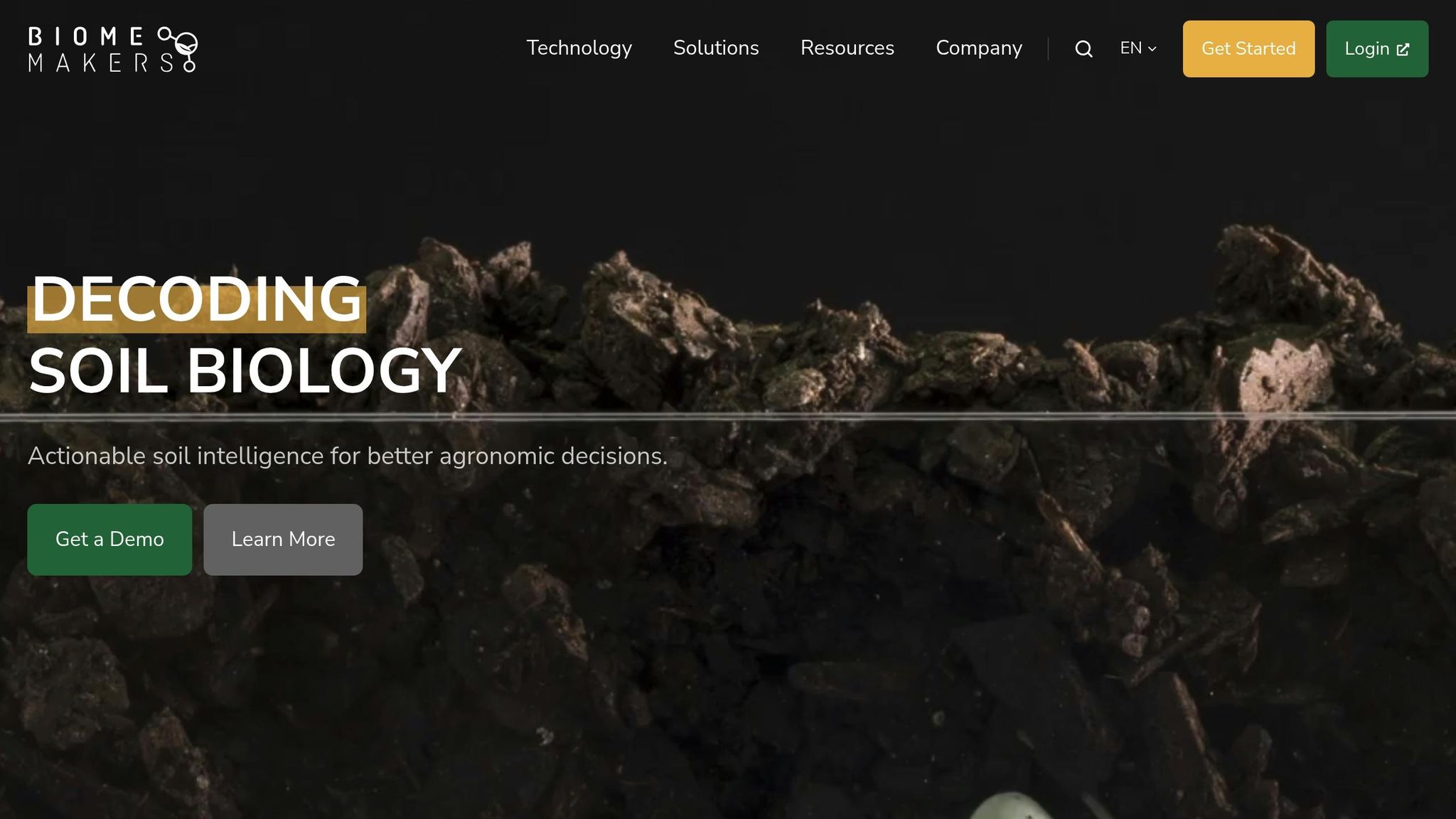
BeCrop by Biome Makers takes a unique approach to soil health by focusing on the biological activity that makes nutrients available to plants, rather than just measuring the raw nutrient content. This AI-driven platform examines soil microbiome DNA to understand how microorganisms play a role in nutrient cycling within compost and soil systems.
Nutrient Profiling
Instead of simply measuring the total amount of nutrients in your compost, BeCrop evaluates the microbial processes that influence nutrient availability. It highlights beneficial processes, like mineralization and solubilization, which convert nutrients into forms plants can absorb. At the same time, it identifies harmful processes, such as immobilization, which trap nutrients in forms that plants can't use [10].
"BeCrop® does not measure the amount of nutrients, but it does quantify the microbial processes involved in nutrient cycling, such as those that supply plants with available nutrient forms (eg. mineralization or solubilization), and those that immobilize nutrients back into forms not readily available for plants (immobilization)." - Biome Makers [10]
The platform provides insights into phosphorus and potassium solubilization, revealing the presence of microbes that make these critical macronutrients accessible to plants. BeCrop Management tests often uncover higher levels of phosphorus and potassium-solubilizing microbes, better carbon pathways, and improved overall soil health [12][13].
This emphasis on biological processes rather than traditional nutrient measurements sets BeCrop apart, making it a valuable tool for advancing sustainable farming practices.
Data Sources
BeCrop taps into a massive database of 44.7 million taxonomic references using Next Generation Sequencing technology [11]. This allows the platform to analyze data from over 200 crops grown in 56 countries, offering a detailed look at how microbes interact with various plants and environmental conditions [11]. Proprietary sequencing workflows and advanced computing algorithms transform this complex microbiome data into actionable insights farmers can use [14].
Target Audience
BeCrop is designed for farmers and agricultural professionals who rely on data to make smarter decisions about soil health and crop productivity. Through the BeCrop Portal, users receive tailored insights that guide their farming practices. By delivering standardized metrics for soil sustainability and long-term health, the platform supports sustainable agriculture initiatives [16].
Pricing Model
While specific pricing details aren’t publicly available, BeCrop is positioned as a high-end solution for commercial farming operations. Its value lies in its ability to recommend precise interventions. For instance, if phosphorus or potassium levels are flagged as low, the system can suggest specific inoculants to address these issues [13]. Biome Makers also collaborates with universities, industry experts, crop advisors, and farmers to refine and expand its solutions [15].
Tool Comparison: Pros and Cons
When it comes to AI tools for compost nutrient analysis, each option has its own strengths and weaknesses. Choosing the best tool depends on your specific needs, whether you're a home gardener, a commercial farmer, or a researcher. Here's a closer look at how these tools stack up.
AIGardenPlanner is a go-to choice for home gardeners thanks to its affordability and ease of use. It combines garden design features with basic nutrient guidance, making it perfect for beginners. However, its focus on design and plant recommendations means it lacks the detailed nutrient analysis provided by more advanced soil testing tools.
AI-Enhanced Soil Testing Tools are a powerhouse for precision agriculture. They offer nutrient analysis with a 95% accuracy improvement, delivering results in just minutes [17]. Using colorimetric paper sensors and smartphone readouts, these tools accurately classify soil pH in 97% of cases, cutting analysis time dramatically compared to traditional methods [18]. Machine learning algorithms further enhance their recommendations by integrating the latest agricultural practices and research [7].
"We're seeing farmers use this technology to maintain optimal soil conditions without synthetic inputs, leading to more sustainable and resilient farming systems." – Dr. Sarah Thompson, a soil scientist at the University of Alberta [17]
The results are impressive. Farmers in Lethbridge have reported a 15–20% reduction in organic fertilizer use while maintaining or even improving yields [17]. Similarly, Morrison Family Farm near Lacombe experienced a 30% increase in beneficial microorganism populations over two growing seasons, thanks to ML-guided soil management [17].
BeCrop by Biome Makers takes a unique approach by focusing on microbial processes instead of just nutrient levels. Drawing from a massive database with 44.7 million taxonomic references, it analyzes data from over 200 crops across 56 countries [11]. While its depth and scope are ideal for research and sustainability-focused farming, the platform requires expert interpretation, making it less accessible for casual users.
| Tool | Best For | Key Strength | Main Limitation |
|---|---|---|---|
| AIGardenPlanner | Home gardeners, beginners | Affordable, easy to use | Limited detailed nutrient analysis |
| AI-Enhanced Soil Testing | Precision agriculture, commercial farms | High accuracy, real-time results | Requires technical expertise |
| BeCrop by Biome Makers | Research, sustainability initiatives | Comprehensive microbial insights | Not user-friendly for casual users |
Cost Considerations: AIGardenPlanner stands out with its transparent, budget-friendly pricing, making it accessible for most users. On the other hand, AI-Enhanced Soil Testing Tools and BeCrop are better suited for commercial or research purposes due to their higher costs. That said, investments in ML-driven soil analysis can pay off, with savings like 30% less water usage and up to 25% yield improvements [17].
One major hurdle is the technical expertise required to develop and use machine learning models effectively. This challenge is especially pronounced in underdeveloped regions, where access to such expertise is often limited [17]. Overcoming this barrier is essential to fully leveraging AI in compost nutrient analysis.
Conclusion
AI-driven compost nutrient analysis is reshaping how gardeners and farmers approach soil health by offering solutions tailored to individual needs, skill levels, and budgets. Here’s a quick look at how these tools cater to different users:
- AIGardenPlanner: Designed for beginners, this tool blends user-friendly features with basic nutrient guidance, making sustainable gardening more accessible.
- AI-Enhanced Soil Testing Tools: These tools provide real-time, precise insights into soil conditions, enabling commercial farmers and precision agriculture operations to make smarter decisions for improving soil health.
- BeCrop by Biome Makers: Focused on microbial activity, this tool helps research institutions and eco-conscious operations better understand and manage soil processes for sustainable growth.
AI is driving a transformation in agriculture. By 2030, AI-powered practices are expected to increase crop yields by 70% while reducing pesticide use by up to 80% [20][19]. This shift aligns with the growing demand for sustainable food production.
To make the most of these tools, adopting a data-driven mindset is essential. Unlike traditional soil testing, which offers a one-time snapshot, AI-powered systems provide continuous, real-time monitoring. This deeper insight uncovers the complex interactions that influence soil health, building on earlier efforts to minimize fertilizer waste and reduce environmental harm [19].
FAQs
How do AI tools make compost nutrient analysis faster and more accurate than traditional methods?
AI tools bring a new level of precision and efficiency to compost nutrient analysis by leveraging advanced algorithms and real-time data tracking. By continuously monitoring key factors such as temperature, moisture, and oxygen levels, these systems help maintain the ideal conditions for decomposition. The result? A faster composting process with less environmental impact, including reduced greenhouse gas emissions.
On top of that, AI-powered image analysis can sort and classify organic materials, offering detailed information about nutrient content like nitrogen, phosphorus, and potassium. This approach not only streamlines the composting process but also minimizes manual effort and delivers higher-quality compost, perfect for gardening and landscaping projects.
What should I look for in an AI tool to analyze compost nutrients for my garden or farm?
When selecting an AI tool for analyzing compost nutrients, look for features like real-time monitoring, data analysis, and ease of use. Real-time monitoring allows you to keep tabs on key factors such as temperature, moisture, and oxygen levels, ensuring your composting process stays on track for efficient decomposition. Some AI tools even offer predictive insights, helping you adjust conditions and nutrients to suit your specific soil and environment.
It's also important to choose a tool with a straightforward, user-friendly interface that integrates smoothly with your gardening or farming setup. This ensures you can access practical insights without needing advanced technical skills. With these features, you’ll be better equipped to refine your composting process and achieve healthier results for your plants.
How can AI tools for compost nutrient analysis support sustainable farming and reduce the need for synthetic fertilizers?
AI tools for analyzing compost nutrients are transforming farming practices by reducing the need for synthetic fertilizers. These tools rely on advanced algorithms to evaluate the nutrient content in compost and soil, offering precise recommendations tailored to the needs of specific crops. This not only cuts down on nutrient waste but also helps address environmental concerns like water pollution caused by fertilizer runoff.
Beyond analysis, AI also improves the composting process itself. By ensuring organic materials decompose efficiently, it produces high-quality compost that enhances soil health and encourages beneficial microbial activity. With real-time insights and practical recommendations, these tools enable farmers and gardeners to make smarter, eco-conscious choices, driving forward sustainable agriculture.
🎨 Visualize Your Dream Garden Today!
Transform any outdoor space into a professional landscape design in minutes. Just upload a photo, choose your style, and let our AI do the rest.
Start your garden transformation now →Related Blog Posts
Related Articles
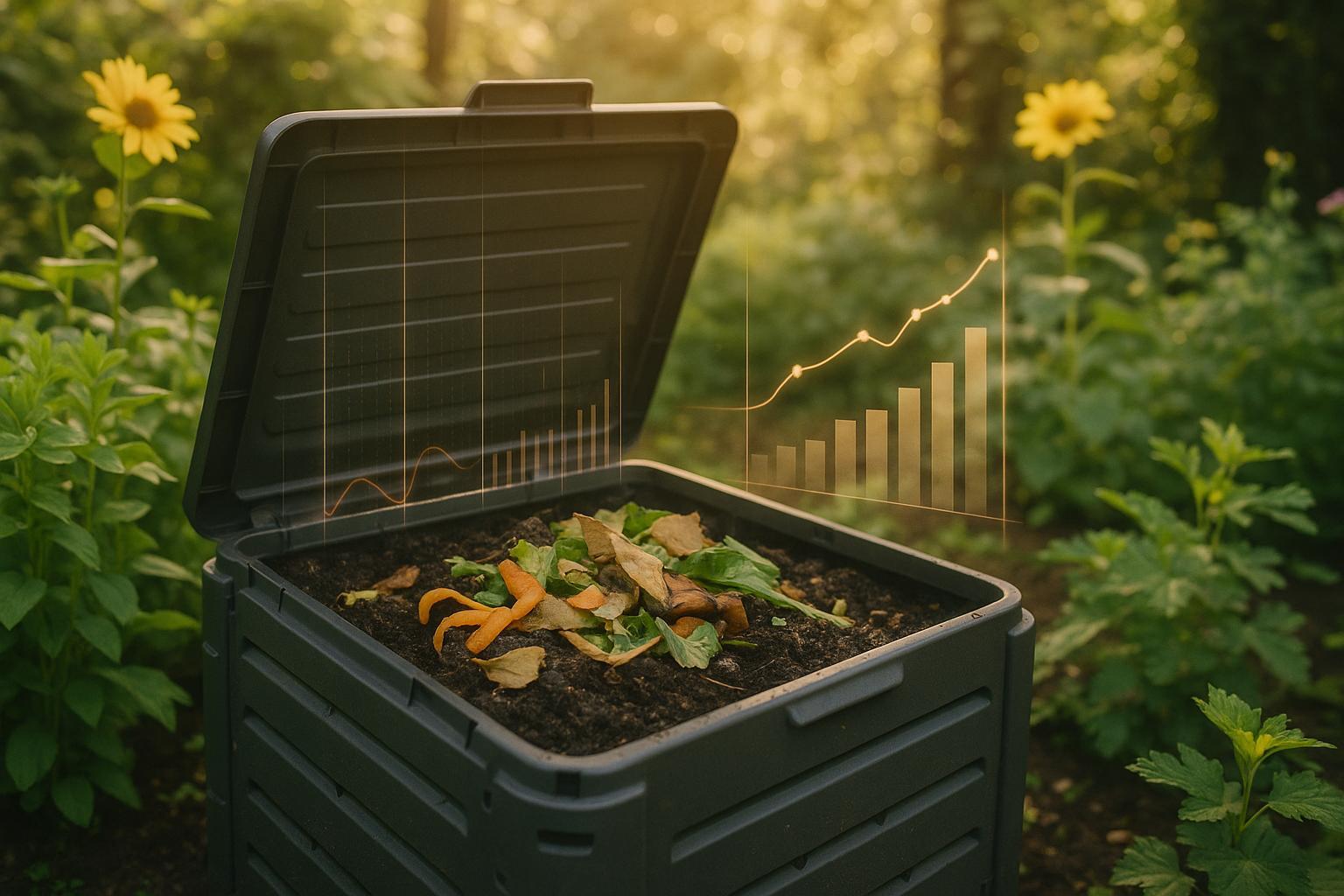
AI Models for Compost Decomposition Rates
Explore how AI models are revolutionizing composting by enhancing efficiency, reducing costs, and improving compost quality through real-time monitoring and predictions.
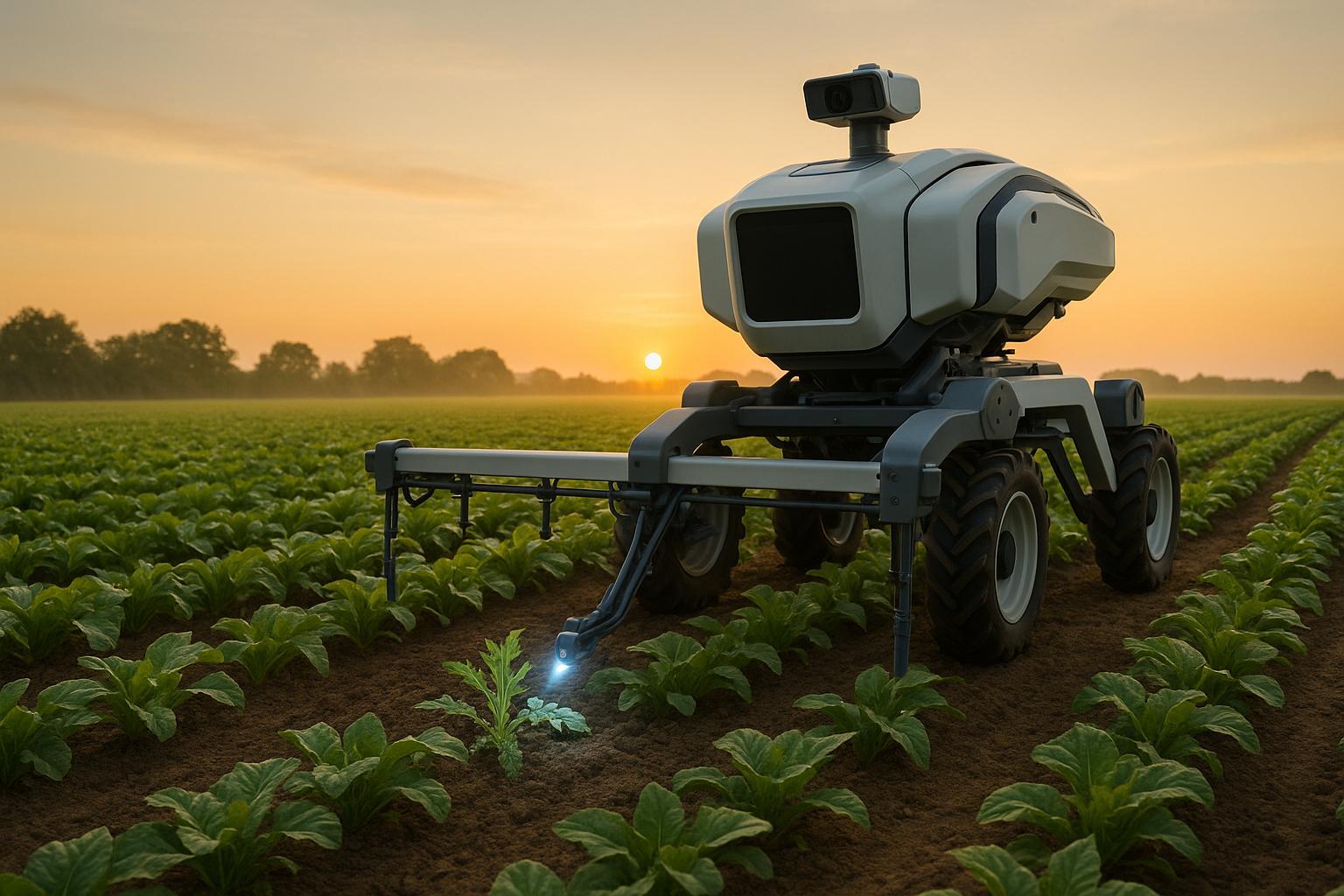
Designing Interfaces for AI Weed Control Systems
Explore how user-friendly design principles in AI weed control systems enhance efficiency, reduce costs, and transform modern agriculture.

AI Climate Analysis for Plant Selection
Explore how AI is revolutionizing gardening by providing tailored plant recommendations based on local climate and conditions, ensuring resilient gardens.

Creative Ways to Use and Preserve Zucchini from Your Garden
Discover the benefits of having an abundance of zucchini from your garden and explore delicious recipes, storage tips, and community sharing ideas in this comprehensive guide.

Ultimate Guide to AI Pest Control with Predators
Explore how AI and natural predators can revolutionize pest control, enhancing garden health while minimizing chemical use and costs.
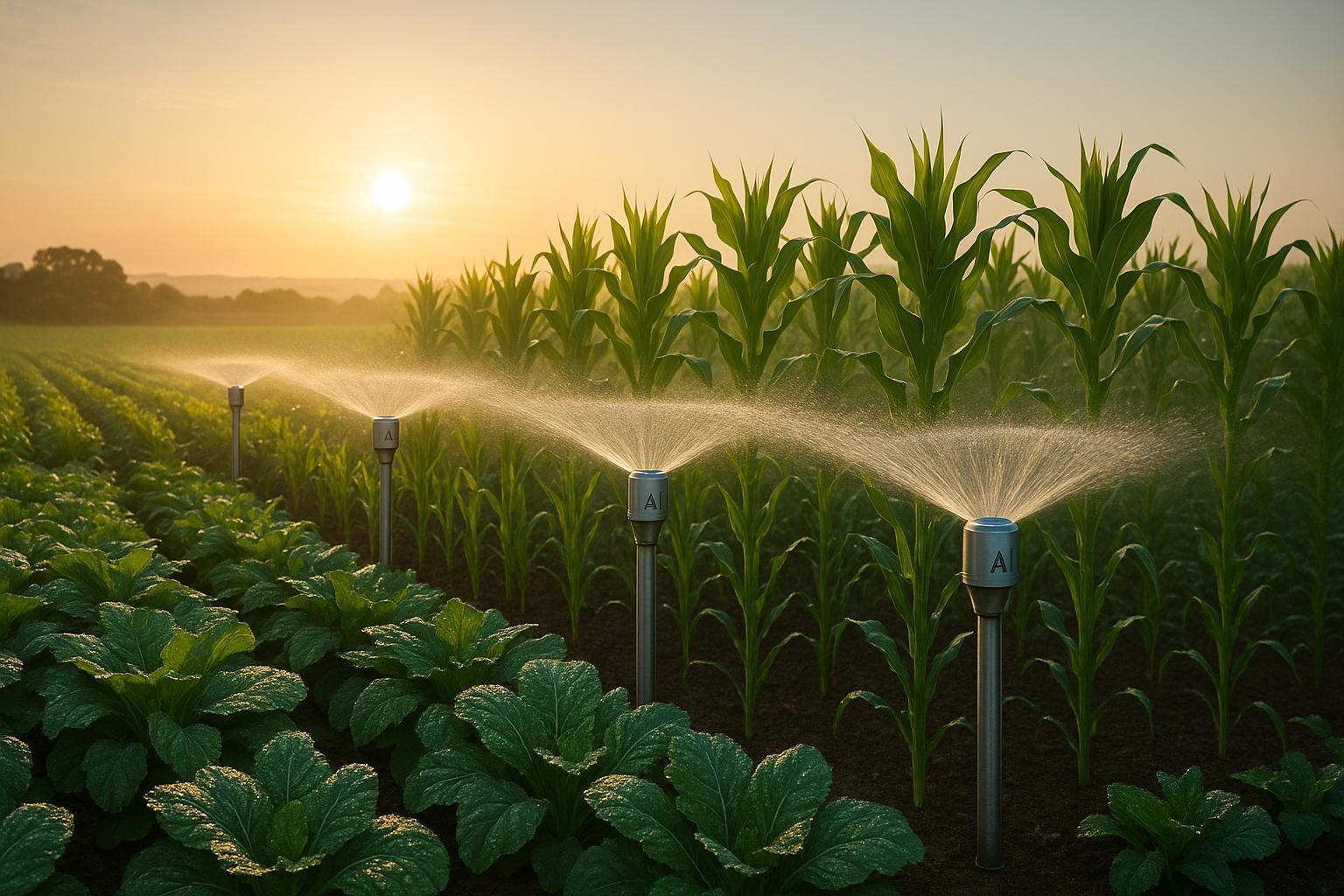
Checklist for AI-Optimized Irrigation
Explore how AI irrigation systems enhance water efficiency, boost crop yields, and simplify garden management through smart technology.